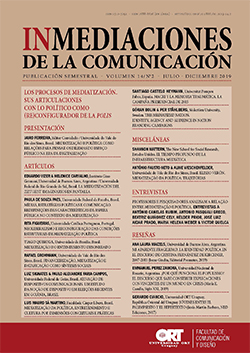A nação mediatizada. Identidade, agência e audiência em campanhas de nation branding
DOI:
https://doi.org/10.18861/ic.2019.14.2.2926Palavras-chave:
Nation branding, midiatização, identidade, audiência, agênciaResumo
Nation branding é uma prática dinâmica de rápido desenvolvimento, é um subprocesso do processo de midiatização mais amplo, utilizada para promover ou reajustar imagens de um estado-nação para turistas ou investidores. Especialmente os estados-nação jovens, sentem a necessidade de criar novas imagens de si mesmos aos olhos do mundo, mas, como esses estados-nação também têm uma história de soberania ainda breve, precisam simultaneamente, construir a solidariedade social e a comunidade interna, para formar a base necessária para a construção de uma nação. Este artigo parte dessa tensão e aborda três temas –agência, audiência e identidade– que consideramos necessitar de mais teorização devido ao fato de a prática ainda estar tentando encontrar sua forma. Esses temas são discutidos em relação aos esforços de criação de marca do novo estado da Ucrânia, no leste europeu, na última década. Conclui-se que as campanhas de nation branding, hoje, são orquestradas também por agências de relações públicas internas (ao contrário do domínio anterior das agências britânicas) que levam em consideração o público interno de outras maneiras, diferentes das campanhas de branding anteriores, e que trazem questões de construção de identidade mais complexas do que as que foram utilizadas anteriormente. O caso ucraniano ilustra, assim, a midiatização de símbolos nacionais na sociedade contemporânea.Downloads
Referências
Adams, S. & Greutzner Robins, A. (eds) (2000). Gendering landscape art. Manchester: Manchester University Press.
Anderson, B. (1991). Imagined communities: reflections on the origin and spread of nationalism. London: Verso.
Anholt, S. (2007). Competitive identity: the new brand management for nations, cities, and regions. New York: Palgrave Macmillan.
Aronczyk, M. (2007). New and improved nations: branding national identity. In Calhoun, C. & Sennett, R. (eds). Practising cultures (pp. 105-128). London: Routledge.
Aronczyk, M. (2008). ‘Living the brand’: nationality, globality and the identity strategies of branding consultants. International Journal of Communication, 2, 41-65.
Aronczyk, M. (2013). Branding the nation. the global business of national identity. Oxford: Oxford University Press.
Bezpiatchuk, Z. (December, 2011). Branding Ukraine: lip-synching a happy tune. The Ukrainian Week, 20. Avaiable on: http://ukrainianweek.com/Society/38090.
Bohlman, P.V. (2004). The Music of European Nationalism. Cultural Identity and Modern History. Santa Barbara: ABC Clio.
Bolin, G. (2002). Nationsmarknadsföring. Eurovisionsschlagerfestivalen som modern världsutställning. In Ericson, S. (ed.). Hello Europe! Tallinn Calling! Eurovision Song Contest 2002 som mediehändelse (pp. 33-42). Huddinge: MKV.
Bolin, G. (2006a). Visions of Europe. Cultural Technologies of Nation States. International Journal of Cultural Studies, 9(2), 189-206.
Bolin, G. (2006b). Electronic Geographies. Media Landscapes as Technological and Symbolic Environments. In Falkheimer, J. & Jansson, A. (eds). Geographies
of Communication. The Spatial Turn in Media Studies (pp. 67-86). Göteborg:
Nordicom.
Bolin, G. & Hepp, A. (2017). The complexity of mediatization: charting the road ahead. In Driessens, O., Bolin, G., Hepp, A. & Hjarvard, S. (eds), Dynamics of mediatization: institutional change and everyday transformations in a digital age (pp. 315-332). London: Palgrave.
Bolin, G. & Ståhlberg, P. (2010). Between community and commodity. nationalism and nation branding. In Roosvall, A. & Salovaara Moring, I. (eds). Communicating the Nation. National Topographies of Global Media Landscapes (pp. 79-101). Göteborg: Nordicom.
Bolin, G. & Ståhlberg, P. (2015). Mediating the Nation State: The Role of “The Media” in Nation Branding Campaigns. International Journal of Communication, 9, 3065–3083.
Bourdieu, P. (1983/1993). The Field of Cultural Production, or: The Economic World Reversed. In: Bourdieu, P. (1993). The field of cultural production. essays on art and literature (pp. 29-73). Cambridge: Polity.
Calhoun, C. (2007). Nationalism and cultures of democracy. Public Culture, 19(1), 151-173.
Davies, A. (2013). Promotional cultures. Polity: Cambridge.
Geertz, C. (1973). The interpretation of cultures. New York: Basic Books.
Graan, A. (2013). Counterfeiting the Nation? Skopje 2014 and the Politics of Nation Branding in Macedonia. Cultural Anthropology, 28(1), 161-179.
Hepp, A. (2013). Cultures of mediatization. Cambridge: Polity Press.
Hepp, A. & Krotz, F. (eds.) (2014). Mediatized iFirst, worlds: culture and society in a media age. Houndmills: Palgrave MacMillan
Hjarvard, S. (2013). The mediatization of culture and society. London: Routledge.
Hobsbawm, E. & Ranger, T. (eds) (1983). The invention of tradition. Cambridge: Cambridge University Press.
Jansen, S. C. (2008). Designer Nations: neo-liberal nation branding – brand Estonia. Social Identities, 14(1), 121-142.
Jordan, P. (2011). The Eurovision Song Contest: Nation Branding and Nation Building in Estonia and Ukraine. PhD thesis, University of Glasgow, Glasgow, Scotland.
Jordan, P. (2013). Nation Branding: a tool for nationalism? Journal of Baltic Studies, 1-13.
Kaneva, N. (2011). Nation Branding: toward an agenda for critical research. International Journal of Communication, 5, 117-141.
Kaneva, N. (ed.) (2012). Branding post-communist nations. marketizing national identities in the ‘New’ Europe. New York & London: Routledge.
Kaneva, N. & Popescu, D. (2011). National identity lite: nation branding in post-communist Bulgaria and Romania. International Journal of Cultural Studies, 14(2), 191–207.
Lundby, K. (ed.) (2014). Mediatization of communication. Berlin: de Gruyter.
Lury, C. (2004). Brands. The logos of the global economy. London & New York: Routledge. Myroshnychenko, V. (Jun., 2006).
‘Брендстраныкакдвигательэкономического
развития’ (The country brand as a driver of economic growth). Комп&ньоН
(Companion), 24(488), 16–22.
Olins, W. (2003). On brands. London: Thames & Hudson.
Ståhlberg, P. & Bolin, G. (2016). Having a soul or chosing a face? Nation branding and the concept of “identity”. Social Identities, 22(3), 274-290.
Valaskivi, K. (2013). A Brand new future? Cool Japan and the social imagenary of the branded nation. Japan Forum, 25(4), 485-504.
Varga, S. (2013). The politics of nation branding: collective identity and public sphere in the neoliberal state. Philosophy and Social Criticism, OnlineFirst, DOI:10.1177/0191453713494969.
Volcic, Z. & Andrejevic, M. (2011). Nation branding in the era of commercial nationalism. International Journal of Communication, 5, 598-618.
Wolczuk, K. (2000). History, Europe and the ‘national idea’: the ‘official’ narrative of national identity in Ukraine. Nationalities Papers, 28(4), 671-694.





